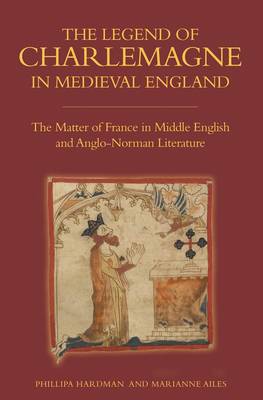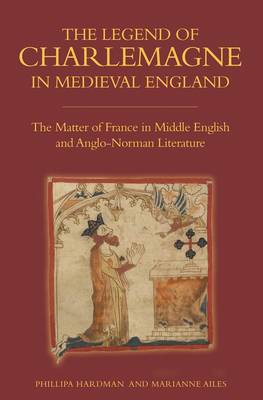
Je cadeautjes zeker op tijd in huis hebben voor de feestdagen? Kom langs in onze winkels en vind het perfecte geschenk!
- Afhalen na 1 uur in een winkel met voorraad
- Gratis thuislevering in België vanaf € 30
- Ruim aanbod met 7 miljoen producten
Je cadeautjes zeker op tijd in huis hebben voor de feestdagen? Kom langs in onze winkels en vind het perfecte geschenk!
- Afhalen na 1 uur in een winkel met voorraad
- Gratis thuislevering in België vanaf € 30
- Ruim aanbod met 7 miljoen producten
Zoeken
The Legend of Charlemagne in Medieval England
The Matter of France in Middle English and Anglo-Norman Literature
Phillipa Hardman, Marianne Ailes
€ 64,45
+ 128 punten
Uitvoering
Omschrijving
The Matter of France, the legendary history of Charlemagne, had a central but now largely unrecognised place in the multilingual culture of medieval England. From the early claim in the Chanson de Roland that Charlemagne held England as his personal domain, to the later proliferation of Middle English romances of Charlemagne, the materials are woven into the insular political and cultural imagination. However, unlike the wide range of continental French romances, the insular tradition concentrates on stories of a few heroic characters: Roland, Fierabras, Otinel. Why did writers and audiences in England turn again and again to these narratives, rewriting and reinterpreting them for more than two hundred years?
This book is the first full-length study of the tradition. It investigates the currency and impact of the Matter of France with equal attention to English and French-language texts, setting each individual manuscript or early printed text in its contemporary cultural and political context. The narratives are revealed to be extraordinarily adaptable, using the iconic opposition between Carolingian and Saracen heroes to reflect concerns with national politics, religious identity, the future of Christendom, chivalry and ethics, and monarchy and treason.
PHILLIPA HARDMAN is Reader in Medieval English Literature (retired) at the University of Reading; MARIANNE AILES is Professor of French at the University of Bristol.
This book is the first full-length study of the tradition. It investigates the currency and impact of the Matter of France with equal attention to English and French-language texts, setting each individual manuscript or early printed text in its contemporary cultural and political context. The narratives are revealed to be extraordinarily adaptable, using the iconic opposition between Carolingian and Saracen heroes to reflect concerns with national politics, religious identity, the future of Christendom, chivalry and ethics, and monarchy and treason.
PHILLIPA HARDMAN is Reader in Medieval English Literature (retired) at the University of Reading; MARIANNE AILES is Professor of French at the University of Bristol.
Specificaties
Betrokkenen
- Auteur(s):
- Uitgeverij:
Inhoud
- Aantal bladzijden:
- 489
- Taal:
- Engels
- Reeks:
- Reeksnummer:
- nr. 8
Eigenschappen
- Productcode (EAN):
- 9781843846017
- Verschijningsdatum:
- 16/04/2021
- Uitvoering:
- Paperback
- Formaat:
- Trade paperback (VS)
- Afmetingen:
- 140 mm x 216 mm
- Gewicht:
- 557 g

Alleen bij Standaard Boekhandel
+ 128 punten op je klantenkaart van Standaard Boekhandel
Beoordelingen
We publiceren alleen reviews die voldoen aan de voorwaarden voor reviews. Bekijk onze voorwaarden voor reviews.









